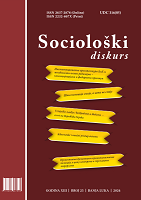ИНСТИТУЦИОНАЛНА АРХИТЕКТУРА БОСНЕ И ХЕРЦЕГОВИНЕ И МОГУЋНОСТИ ЊЕНОГ РЕДИЗАЈНА – КОНСОЦИЈАЦИЈСКИ И ФЕДЕРАЛНИ ПРИСТУП
INSTITUTIONAL ARCHITECTURE OF BOSNIA AND HERZEGOVINA AND THE POSSIBILITIES OF ITS REDESIGN - CONSOCIATIONAL AND FEDERAL APPROACH
Author(s): Vlade SimovićSubject(s): Political Theory, Political Sciences, Political history, Government/Political systems, Politics and society, Transformation Period (1990 - 2010), Present Times (2010 - today)
Published by: Naučno udruženje Sociološki diskurs
Keywords: Bosnia and Herzegovina; divided society; Dayton Peace Agreement; Constitution of Bosnia and Herzegovina; consociational democracy;
Summary/Abstract: The institutional architecture of Bosnia and Herzegovina and the possibilities of its redesign are the subject of numerous political and theoretical discussions and initiatives. The consequence of this is the fact that from 1995 until today, a number of political-systemic changes and political experiments have been carried out. They were most often the product of foreign interventionism embodied in the actions of high representatives. High representatives, in addition to their Dayton competences, and with the power of the Peace Implementation Council, replaced legitimately elected representatives and passed laws instead of parliaments. This made the Constitution and democracy in Bosnia and Herzegovina meaningless, and the warring nations were further divided and frustrated. The agreement of the national-party elites in Bosnia and Herzegovina regarding constitutional changes and the departure of the high representative is the most important political priority. However, the initiatives of the national-pariah elites for the political-systemic redesign of Bosnia and Herzegovina are completely opposite. Bosniak parties and civic-oriented circles advocate centripetal solutions, while Serbian and Croatian elites advocate a centrifugal political system. The thesis of this paper is that in the conditions of the divided and post-conflict society of Bosnia and Herzegovina, it is necessary to accept the centrifugal, consociationally shaped federation that was largely defined in Dayton, with rational changes that will lead to a more stable and functional system. The experiences of countries with similar institutional frameworks, such as Belgium and Switzerland, show that the consistent application of consociational logic and federalism can prove extremely successful.
Journal: Sociološki diskurs
- Issue Year: 13/2024
- Issue No: 25
- Page Range: 7-31
- Page Count: 25
- Language: Serbian

